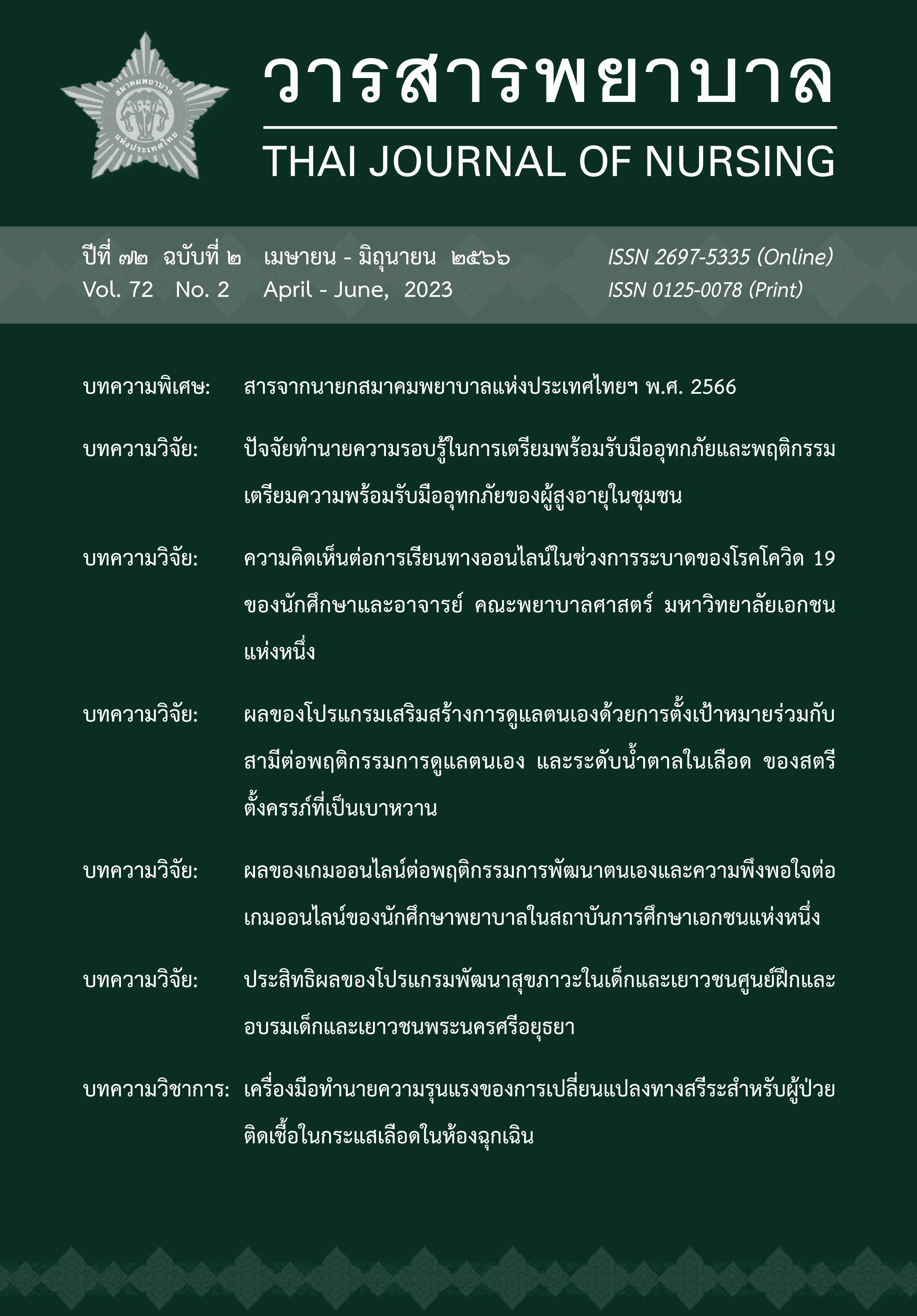Opinion toward online learning during COVID-19 pandemic among students and lecturers at the faculty of nursing in a private university
Main Article Content
Abstract
The descriptive research aims to study opinion toward online learning during COVID-19 pandemic among students and lecturers at the faculty of nursing in a private university. A sample of 219 students and 25 lecturers was purposively selected. Research instruments were questionnaires on opinion toward online learning during COVID -19 pandemic for students and for lecturers. Their reliability coefficients were 0.81 and 0.78 respectively. The results are as follows. 1) Nursing students’ opinion toward online learning during COVID-19 pandemic, are at a moderate level, but lecturers’opinion are at a high level. 2) In the subpart of attitude toward benefits of online learning, their opinion are at a high level in both groups of students and lecturers. In the subpart of problem during online learning, their opinion are at a moderate level in both groups of students and lecturers. In the subpart of activities/problems of online learning, students’ opinion are at a moderate level but lecturers’ opinion are at a high level.
Article Details

This work is licensed under a Creative Commons Attribution-NonCommercial-NoDerivatives 4.0 International License.
References
มนัสนันท์ หัตถศักดิ์. (2564). การศึกษาสภาพปัญหา และความพึงพอใจในการเรียนรูปแบบออนไลน์ใน สถานการณ์การแพร่ระบาดของโรคติดเชื้อไวรัสโคโรน่า 2019 (โควิด19) ของนิสิตมหาวิทยาลัยเกษตรศาสตร์ บางเขน. วารสารวิจัยทางการศึกษา, 16(1), 202-213.
มาลีวัล เลิศสาครศิริ, และ รัตนา พึ่งเสมา. (2564). ปัจจัยที่มีผลต่อพฤติกรรมการเรียนผ่านระบบออนไลน์ของนักศึกษาวิทยาลัยเซนต์หลุยส์ จากสถานการณ์โควิด-19. วารสารสุขภาพกับการจัดการสุขภาพ, 7(1), 13-27.
สุขนิษฐ์ สังขสูตร, และ จอมเดช ตรีเมฆ. (2564). การศึกษาความพึงพอใจต่อรูปแบบการเรียนการสอนออนไลน์ในสถานการณ์การระบาด ของโรคติดเชื้อโควิด-19 ของมหาวิทยาลัยรังสิต. เอกสารสืบเนื่องจากการประชุมวิชาการระดับชาติ มหาวิทยาลัยรังสิต ประจำปี 2564. https://rsucon.rsu.ac.th/proceedings
สุชาติ เครื่องชัย, ยงยุทธ แก้วเต็ม, และ วันวิสาข์ ชูจิตร. (2564). ความพร้อม ผลลัพธ์ที่พึงประสงค์ และความพึงพอใจของการจัดการเรียนการสอน ผ่านระบบอิเล็กทรอนิกส์ (ON LINE) วิชาการรักษาพยาบาลเบื้องต้นในสถานการณ์การแพร่ระบาดของเชื้อไวรัสโคโรนา 2019 (COVID-19). วารสารวิชาการมหาวิทยาลัยราชภัฏอุตรดิตถ์ สาขาวิทยาศาสตร์และเทคโนโลยี (เพื่อการพัฒนาท้องถิ่น), 16(1), 105-127.
Adnan, M., & Anwar, K. (2020). Online learning amid the COVID-19 pandemic: Students perspectives. Online Submission, 2(1), 45-51. https://doi.org/10.33902/JPSP. 2020261309
Best, J. W. (1977). Research in education. Prentice Hall.
Dewart, G., Corcoran, L., Thirsk, L., & Petrovic, K. (2020). Nursing education in a pandemic: Academic challenges in response to COVID-19. Nurse Education Today, 92, Article e104471.
doi: 10.1016/j.nedt.2020.104471
Guglielmino, L. M. (1977). Development of the self-directed learning readiness scale [Unpublished doctoral dissertation]. University of Georgia.
Jones, K., Hein, L. C., & James, L. (2021). A nursing leadership practicum in the time of COVID-19: A
Southeastern University experience. Nurse Leader, 19(2), 145-149. https://doi.org/10.1016 /j.mnl.2020.06.010
Liu, Y. M., Chen, M. C., Chung, F. F., Huang, H. P., Chao, L. F., Chen, M. Y., Jane, S. W., & Fan, J. Y. (2020). Challenges to the nursing practicum during the COVID-19 pandemic. Hu Li Za Zhi, 67(6), 25-31. doi: 10.6224/JN.202012_67(6).05
Mitchell, M. M., & Delgado, C. (2014). Online learning: Advantages and challenges in implementing an effective practicum experience. Open Journal of Nursing, 4(6), 379-384. doi:10.4236/ojn.2014. 46044
Subedi, S., Nayaju, S., Subedi, S., Shah, S. K., & Shah, J. M. (2020). Impact of E-learning during COVID-19 pandemic among nursing students and teachers of Nepal. International Journal of Science and Healthcare Research, 5(3), 68-76.
Yamane, T. (1973). Statistics: An introductory analysis (3rd ed.). Harper and Row.


